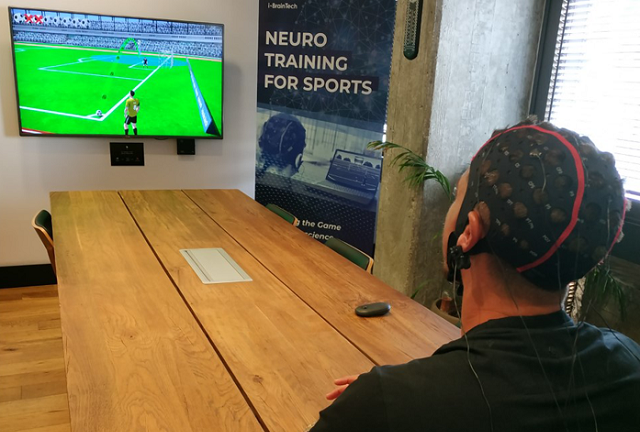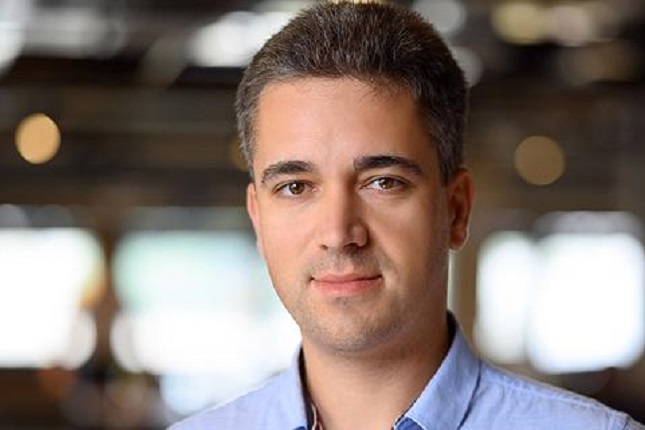The new understanding of how the brain works is also used to treat brain injuries.
Israeli startup i-BrainTech is offering athletes a way to improve themselves while also treating brain injuries. It does so by using its AI-powered brain-training solution which can train the brain not unlike how people improve their muscles working out at the gym.
i-BrainTech’s clinically proven technology translates movements envisioned in the brain into virtual actions displayed in a contextually relevant video game. This repeated process directly trains the motor control centers in the brain and results in improved physical performance in sports.
It works with a cap that a person wears which connects to something our of Star Trek.
The technology is also being applied in clinics and has been proven in stroke and brain injury recovery. And it can be used to treat cerebral palsy.
Now think about that for just a moment. A cure, or at least a real treatment for cerebral palsy.
If that is not enough to be blown away, then brace yourself before reading the next line.
Imagine a world where no one is neither a righty or a lefty, where every single person is fully ambidextrous. Ever wished you could right with both your right and left hand?
Well this is exactly where i-BrainTech’s new technology is going.
But i-BrainTech has had its main success in the world of professional sports.
Today the company focuses on athletes, helping them through brain training to use both sides of their body so that one day they can use each sides as effectively as the other. It’s like working out in a gym. If you put extra effort in your weaker arm then it will get stronger.
i-BrainTech has a tool which does just that, but for the brain. The younger a person is, the easier and more beneficial the training is. So if athletes get this training while still in high school and college then they could move on to break every record.
–
[embedded content]
Think of every pitcher in baseball being a “switch” pitcher. No more pitch counts. You pitch every other time with your right arm and every other time with your left, thereby greatly extending your career. Or you can switch arms in the middle of a game.
You are an NFL quarterback and a righty. When scrambling to the left being chased from your right it is harder to make a pass. Not anymore. Just throw with your left arm instead since now you can use both sides of your body.
Konstantin Sonkin is the company’s 34 year old founder. He came to live in Israel with his young family just three years ago and no it was not in search of a Startup Nation success story.
Konstantin cane to Israel solely out of ideology. While he had, of course, heard about Startup Nation, Konstantin did not see any better opportunities here for developing his product ideas than in Russia.
“I arrived with my wife and 2 very small children 1.5 and 2.5 at the time. We left behind our careers.” Konstantin worked as the chief engineer at an industrial engineering company and gave up his job with no guarantees of job offers in Israel. “Sometimes you do things that are correct or right, but you don’t have reasons for it,” he said.
The holder of a PhD in computer science with honors from the St. Petersburg Polytechnic University, Konstantin Sonkin feels that with the bureaucracy in Russia it might have been easier to get started.
He tells a great story about how hard it is to even get started as a new immigrant in Israel.
”The bureaucracy in Israel is one of the worst in the world. Even as late as 2017 I was desperate to open a bank account here, in Russia I could have done it with an app, but here the people made me do so many things just to open one. I had a family and 2 small kids, what do you do,” recounts Konstantin.
In order to move forward with his dream of actually building new products which will help people based on his research in the workings of the human brain, Konstantin studied for an MBA at Tel Aviv University.
Konstantin used his time there learning how to translate his scientific knowledge into entrepreneurial success. He really feels like the program was tailored to his needs and even said that he felt like the director there was speaking directly to him.
He started i-BrainTech before he even completed the MBA.
–
[embedded content]
But Konstantin does not credit his success and his company’s advance to the whole Startup Nation mythos.
“Startup Nation exists somewhere,” he explains, “but not where I lived. In normal everyday places, I didn’t feel it in university either where it was about publishing in journals, not creating products.”
Konstantin is a doer. When speaking with him you really feel his passion for actually getting something done. You get a sense for his dedication to his work even when being forced to talk with Konstantin via a video chat because of the Corona shutdowns.
“We all do science and research but I don’t understand people who are not interested in making the next step and creating something,” explains Konstantin.
“Try to make something useful from your work. Invention is making something but innovation is making the idea to work for people.”
“To be a real startup nation we really need to bridge the gap between the science and the industry.”
Konstantin feels that Startup Nation may be more about making social media companies, new websites and apps and not really about building something real, or changing the world. Many agree and cite the rush to make the big exit, or IPO is all that people think about and that incubators in Israel care mostly about what has the best chance for financial success. They do not encourage visionaries to invent things.
TAU had just opened a new center on brain sciences and he led the project – almost 14 people in the lab focusing on brain rehabilitation/recovery.
Konstantin’s research dealt largely with brain injuries caused by accidents. Think of all of the people who were left disabled after a head injury from a fall or a car crash.
But this research led to discoveries about the brain which can also be used to treat people suffering from genetic disorders such as cerebral palsy.
Cerebral palsy victims can have high cognitive ability but poor physical abilities. i-Braintech’s tech utilizes artificial intelligence to better understand of brain functions, specifically motor control. Poor motor control is a main symptom of cerebral palsy.
The new tech is already being used at a day care center in Tel Aviv.
Someday we will have something small that fits in a cap which can help us train for just about anything
Read more about: cerebral palsy, i-BrainTech, Konstantin Sonkin





